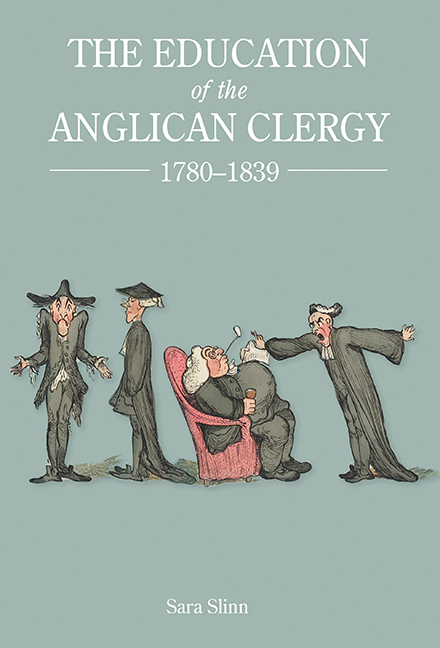Book contents
- Frontmatter
- Contents
- Illustrations
- Acknowledgements
- Abbreviations
- Introduction
- Part One Entrants to the Clerical Profession, 1780–1839
- Part Two Routes to Ordination
- Conclusion
- Appendix 1 Ordination Profiles of Bishops, 1780–1839
- Appendix 2 A Note on Methodology
- Bibliography
- Index
- Miscellaneous Endmatter
Conclusion
Published online by Cambridge University Press: 30 August 2017
- Frontmatter
- Contents
- Illustrations
- Acknowledgements
- Abbreviations
- Introduction
- Part One Entrants to the Clerical Profession, 1780–1839
- Part Two Routes to Ordination
- Conclusion
- Appendix 1 Ordination Profiles of Bishops, 1780–1839
- Appendix 2 A Note on Methodology
- Bibliography
- Index
- Miscellaneous Endmatter
Summary
The Age of the Graduate Clergyman Arrives?
In April 1824, the Reverend Thomas Tattershall presented a paper to the Elland Clerical Society on the subject of the advantages of a university education with a view to the Christian ministry. The issue was of immediate practical concern; the raison d’être of the society was to support the ministerial preparation of as many evangelical aspirant ordinands as it could. It was important that funds were spent prudently, and university education was more expensive than preparing men for orders as non-graduates. The meeting minutes summarised Tattershall's presentation as follows:
Objections:
1. Not religious
2. Its inutility
3. The course of study prescribed not the best adapted for the Christian ministry
4. The loose state of morals in the universities
5. Many return from the university more ignorant than they went.
Benefits:
1. The great opportunities of acquiring literary and philosophical knowledge
2. Circumstances accidental
3. Acknowledged subordination
4. Affords to pious students friendships which may be of lasting benefit to themselves and to their congregations afterwards
5. Renders the individual more acceptable to people.
It is an interesting sign of the times that, by the following year, the society had decided to send all those it adopted to university, except in special circumstances, having resolved, presumably, that the extra expense was compensated for by the broader educational experience, opportunities for networking, and the enhanced status apparently preferred by ‘people’.
Over the six decades from 1780 the graduate-clergyman ideal did, indeed, put down strong roots. After the mid 1820s, nearly all English bishops adopted public policies of accepting only graduates – or in default of these, men who had completed a professional course at the colleges of St Bees or St David's, Lampeter, or at Durham University. Such aspirations were, it transpired, somewhat over-ambitious, and men who had prepared for orders in other ways continued to be received in the dioceses of York and Carlisle until the end of the period. In Wales, efforts to secure a ‘better’ educated clergy took a slightly different form. St David's College, Lampeter, was devised as a Welsh college of higher education: a poor man's substitute for Oxford or Cambridge, which – despite quality issues in its early years – was in due course to provide Wales with graduate clergy.
- Type
- Chapter
- Information
- The Education of the Anglican Clergy, 1780–1839 , pp. 199 - 210Publisher: Boydell & BrewerPrint publication year: 2017



